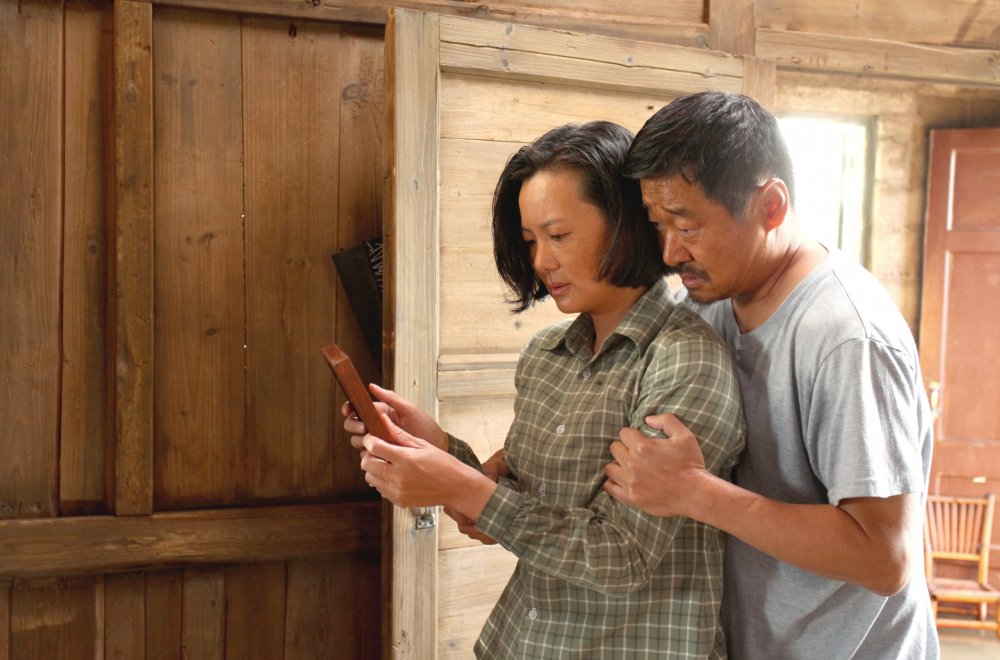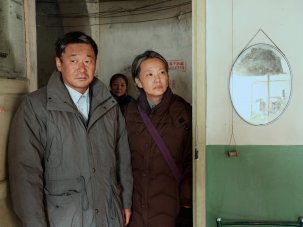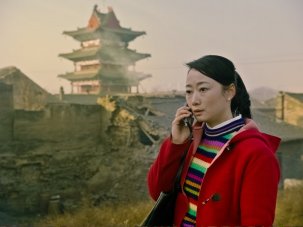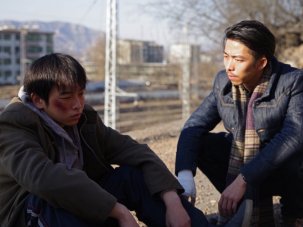Spoiler alert: this review reveals a plot twist.
One of the great challenges for contemporary cinema is to revitalise its status as a storytelling medium, to compete with TV drama’s capacity for potentially unlimited narrative expansion. Very few cinema films, however, have the ambition, energy and resources to tell complex stories about time and changes of personal, social and political fortune with novelistic scope – and to do so convincingly within a standard (or close to standard) feature-length frame. One recent triumph in this vein is Martin Scorsese’s The Irishman, but other notable attempts have come from China: Jia Zhangke’s ambitious but flawed Mountains Must Depart (2015) and genre-inflected melodrama Ash Is Purest White (2018).
People’s Republic of China 2019
Certificate 12A 185m 24s
Director Wang Xiaoshuai
Cast
Liu Yaojun Wang Jingchun
Wang Liyun Yong Mei
Shen Moli Qi Xi
Liu Xing aged 15 Wang Yuan
Shen Hao, ‘Haohao’ Du Jiang
Li Haiyan Al Liya
[1.85:1]
Subtitles
Chinese theatrical title Di jiu tian chang
UK release date 6 December 2019 in cinemas and on demand
Distributor Curzon Artificial Eye
curzonartificialeye.com/so-long-my-son
► Trailer
Another success now comes from Jia’s ‘Sixth Generation’ contemporary Wang Xiaoshuai. Planned as the first part of a so-called ‘Homeland Trilogy’ about China’s past 40 years, Wang’s So Long, My Son is at once family saga and social chronicle, exploring themes of love, loss and isolation, spanning from the 1980s to the present. It pinpoints China’s economic changes no less keenly than Jia’s films, but focuses especially on the personal and social effects of the one-child policy that the Chinese government introduced in 1979 and that lasted until 2015.
This is not an easy film to follow, partly because of a complex time scheme that zigzags repeatedly between decades, partly because characters change their looks through ageing makeup or (in the case of disco-loving bon viveur Xinjian, his foppish locks shorn after his arrest for attending an illicit dance party) different hairstyles and bearing. There are also two children both named Xingxing: a boy who drowns, and the boy later adopted in his place. The English title furthers the confusion: which son is being waved goodbye? This indeterminacy places the film under the general sign of loss. Indeed, factory workers Liyun and Yaojun suffer three losses: the death of their son Xingxing, the forced sacrifice of a second child, the departure of an adopted third.
That last loss may not be irreparable: the film ends with a reunion of estranged friends, a note of renewal (a glimpse of emigrant Moli’s young son in the US, the birth of her niece’s baby in China) and the reappearance of prodigal adopted son Xingxing, now – it’s suggested – reabsorbed into the social order, back from his teenage wanderings with a girlfriend by his side.
Even so, this upbeat – and irresistibly poignant – ending is marked by bitter irony. Haiyan, the unshakably by-the-book factory official who oversaw the government-imposed abortion of her friend Liyun, herself went on to have a second child, now the mother of a newborn, making Liyun and Yaojun’s participation in their family happiness deeply ambivalent. Haiyan herself has now died of a brain tumour, and it is one of the more awkward aspects of the film that this comes across as metaphoric for, or directly a result of, her guilt over Liyun’s abortion, and over her son Haohao’s supposed responsibility for Xingxing’s drowning. And Moli’s young son, the smiling Chinese-American boy seen on Skype, is – unbeknown to all in the room except Yaojun – his child, after he and Moli slept together; this is the child offered as a baby by Moli, Haohao’s aunt, to Yaojun and Liyun as reparation for her family’s part in the couple’s sorrows.
The difficulty of navigating So Long’s complexity is offset by its structural rigour and carefully composed use of visual and musical repetitions. Auld Lang Syne – with Chinese lyrics but still, we hear, a hymn to old acquaintance – underpins the theme of estrangement and reconciliation. The final shot of Yaojun and Liyun at a family celebration, seen through gauze curtains against daylight, echoes the earlier glimpse of a party (the reunion of Xinjian and his partner Meiyu) seen from outside through a frosted window, with snow falling. The early scene in which the frantic parents rush Xingxing to hospital is echoed by another in which Yaojun carries his wife following her apparent suicide attempt. A green-painted hospital corridor twice plays a baleful role.
Shot by Kim Hyun-seok, the film plays eloquently with space. The city apartment block inhabited by the factory workers in the 1980s is at once a discrete series of cramped units and a porous, flexible space for cohabitation, where characters mingle as an extended family – this conviviality only damaged by the official one-child policy, which the officious Haiyan implements mercilessly. At the end of the film, the couple revisit their old home, now cold and deserted. The tight yet joyous spaces of their 1980s habitat are contrasted with the expanses of their new home in the south, where Yaojun runs a repair shop and where everything seems tainted – where their adopted son defiantly rejects his filial role, where they are alienated by language (they don’t understand the dialect of Fujian province) and where their cave-like workspace/home is open to the elements, flooded after a rainstorm. The interior of their dwelling now recalls the reservoir, seen repeatedly in wide shot, where Xingxing drowned.
The film is superbly acted, the cast making their characters consistent even when their demeanour radically changes. The most pronounced case is Xinjian (Zhao Yanguozhang), first seen as a carefree groover who fancies himself as a Hong Kong movie star, later seen morose and beaten down in a jail cell (his friends’ visit, with their smiling inadequacy in responding to his suffering, makes for one of the film’s most extraordinary moments). As played by Yong Mei, Liyun’s pained calm and stoic opacity are compelling throughout, in contrast to the more demonstrative agony of Wang Jingchun’s Yaojun (both performers won Best Actor prizes in Berlin); his expressivity runs from anger to gloomy booziness to crestfallen adoration of Moli with, along the way, a staunch, bearish solicitude towards those around him. Moli, meanwhile (played by Qi Xi), is more elusive: first an eager ingénue; later a rebel within her family, and the only one to criticise government policy; then a mature cosmopolitan, her economic power betokened by elegant couture. Even given her protean nature, however, the film never quite convinces us of Moli’s decision to sleep with Yaojun (an episode that takes place between scenes) or her offer to give the couple her baby.
Beyond its intimate family drama, this is as much a story of social change as Jia Zhangke’s films: the final act’s placing of China in a global perspective, with Moli in the US, is a more reality-grounded answer to the futuristic international perspective that ends Mountains May Depart. A wry ironic gesture in this last section is the sight of a Mao statue – to which Yaojun gives an amused wave – standing outside a shopping mall.
There are striking political setpieces too: one is the ceremony at which, with desolate irony, Liyun and Yaojun receive their factory’s 1986 award for family planning. In a similarly artificial scenario, the factory boss, shown with overstated mockery in a rather obtrusive close-up, sits on stage addressing the workforce. They face layoffs, but he attempts to soft-soap them with talk of all being in the same boat, all pulling together for the general good. So Long, My Son may be about the Maoist legacy, but this scene shows that the rhetoric of cynical leadership is universal, whatever the nation, whatever the political system.
-
The 100 Greatest Films of All Time 2012

In our biggest ever film critics’ poll, the list of best movies ever made has a new top film, ending the 50-year reign of Citizen Kane.
Wednesday 1 August 2012
-
The best films now on UK streaming services

Looking for the best new cinema releases available on British VOD platforms? Here’s our guide to how to keep up with the latest movies while you’re...
-
The Digital Edition and Archive quick link
Log in here to your digital edition and archive subscription, take a look at the packages on offer and buy a subscription.









